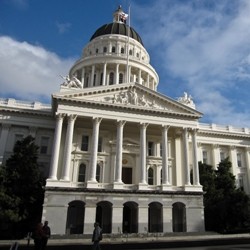California DFS Bill Faces Challenge in 2016

Earlier this year, there was a lot of optimism circulating about the possibility of daily fantasy sports legislation passing in California before the end of 2016. Despite the rumors, however, a close look at the facts indicate that there is unlikely to be any successful push forward on the issue until next year at the earliest.
What’s the Hold Up?
Excitement over daily fantasy sports betting escalated in 2016 when a bill passed with a clear majority in the California Assembly. After that, though, the bill lost momentum and never made it to a vote in the California Senate. While there does not seem to be any major opponents speaking out about the bill, at the same time there also does not to appear to be very many powerful supporters working to get it through, either. Individuals like Jerry Jones and Robert Crafts of the NFL, and Adam Silver of the NBA, are pushing for daily fantasy sports betting at the national level, but unfortunately California is lacking in outspoken voices calling for action.
It’s also important to note that most pieces of legislation do not make it to the Governor’s desk in any state on the first try, and there is some speculation that the bill may need to be revised before it can be brought to another vote. Furthermore, there is talk that California could potentially require operators to partner with casinos or racetracks to give the state’s gambling industry some extra revenue.
Is There Hope of Jump Starting Things?
Individuals who are eager to see daily fantasy sports legalization passed in the Golden State may want to pay attention to the East Coast rather than the West Coast. There, New Jersey is caught up in a legal battle over whether or not the state actually has the right to legalize sports betting.
New Jersey is contesting the PASPA law that prohibits sports betting in the United States, and has one final chance to argue its case in front of the Third Circuit Court in Philadelphia. The major sporting associations are fighting hard to stop the move, saying that it would ruin the integrity of professional sports; however, some experts on the case believe that ultimately things may come down in New Jersey’s favor.
How Is Legalized NJ Sports Betting Good For DFS in California?
Well, if sports betting is allowed in New Jersey, industry insiders believe that a number of the gambling-friendly states and territories may be compelled to quickly enact laws to legalize it. Pennsylvania and the Virgin Islands, in particular, are expected to jump at the chance to offer legal sports betting and to tax it accordingly.
Should these places succeed in passing legislation, California may follow suit, and there is a good chance that the state may include sports betting and daily fantasy sports betting in a single bill. We’ll have to keep our eyes on both Sacramento and Philadelphia’s court to see what ultimately happens.
California iPoker Bill
In the meantime, California iPoker Bill, AB 2863, has been languishing in the Assembly since progressing through the state’s Appropriations Committee on June 22nd. With the legislature’s Summer Recess now over, Adam Gray and Reggie Jones-Sawyer’s bill will once again be taken under consideration, with a vote possible by the end of this week.
According to the bill, only those California Indian tribes running land-based gambling venues for more than three years will be given the chance to offer online poker products, with licenses costing $12.5 million each. A 15 percent tax on gross gaming revenues would then be collected, although reduced rates would be available for operators generating less than $350 million per year.
In an attempt to allay concerns of “bad actors” such as PokerStars entering the Californian market without any associated penalty for past indiscretions, the latest version of AB 2863 proposes that such sites should be charged an inflated license fee of $20 million per annum, or else wait an additional five years before applying for an online gambling license. As the Indian coalition opposing PokerStars’ entry into the Californian market explained back in June:
“Our coalition remains committed to the policy principle that unlawful online gaming, whether in the past, present, or future, must not be incentivized.”










